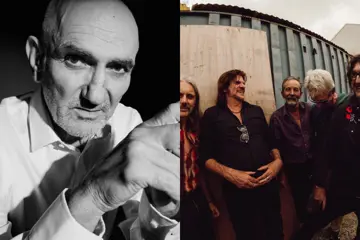Last week marked the 30th anniversary of the release of cult Aussie comedy, Malcolm, directed by the indomitable theatre and filmmaker Nadia Tass. Starring a young and adorably awkward Colin Friels in the title role, this cherished film follows an oddball tinkerer as he uses his zany, Rube Goldberg-esque gadgetry to go on a crime spree.
At a recent celebratory screening of the film to mark its landmark birthday, Tass noticed something telling involving the behaviour of one of the attendees and a gadget of an altogether different type to those found in her film. "There was this young person texting, while Malcolm [Friels] was on screen acting his tits off, and I found myself conflicted. On the one hand, I wanted to tell them to stop, but on the other, I felt that they had a right to sit in that seat and communicate with the outside world if that's what they wanted to do. But there came a point when that phone was put away and that was incredibly interesting for me," Tass shares. "There was a point when that narrative on screen became more interesting than the phone. A point when the story pulled him in and connected with him, and for me, that's a fascinating experiment in how people absorb and understand a story. That's a lesson for me as a director."
"There was this young person texting, while Malcolm [Friels] was on screen acting his tits off."
Tass is hardly a novice when it comes to communicating narratives. With a career spanning almost six decades - she proudly notes her stage debut came while she was still just a toddler, playing Medea's ill-fated son in the Classical Greek epic - she can truly claim to have made the business of storytelling her life's work. However, Tass still considers herself a student of the human condition, continually searching and exploring the shifting psyches of people via both the screen and the stage. In fact, for the past six months, Tass has devoted herself entirely to the theatre, working on a back-to-back string of productions including Ayad Akhtar's Pulitzer Prize-winning Disgraced for Melbourne Theatre Company, Jane Cafarella's new two-hander E-Baby for Sydney's Ensemble Theatre and Hannie Rayson's Extinction for Red Stitch.
All three of these productions, while thematically remote, share a common subtext, Tass explains. "They deal with the struggles of humanity and human beings; they ask questions about ourselves as a species and also those yearning needs of individuals." This investigation of both the macro and micro in her productions is a process that has proven especially useful for her latest theatre venture, staging the Annie Baker translation of Chekhov's melancholy masterpiece Uncle Vanya. Premiered in 1899, this play is a study of desire - intellectual, personal, sexual and emotional - and of loss, including the environmental costs of the industrialised world.
As the child of first-generation immigrants from Macedonia, Chekhov - and Russian theatre in general - is close to Tass' heart, offering a cultural link to her family's Slavic roots. But she also believes that this 117-year-old text has a remarkably alert connection to important issues of the present day. "Chekhov talks about conservation, how to make our lives better and how to respect the earth," Tass observes. "Anyone who might think of Chekhov as a museum piece, a person who lived 'then' who couldn't possibly say anything of contemporary relevance, should see this play. Chekhov speaks directly to us - it's not in riddles or symbolism. It's truth. The clarity with which he speaks to us to say, 'Look at what we're doing to our land and our world,' is phenomenal for someone of that period. It's extraordinary in the truest sense of that word."
Set on a sprawling country estate, one might assume this story demands a theatre on a vast scale, and yet Tass has chosen the extreme intimacy of the Red Stitch Actors Theatre in St Kilda to mount her Uncle Vanya. It's her impressive credentials directing films that have come to bear in managing the issue of proximity. By drawing on her experience with the fine detailed scrutiny of the camera lens, she has turned the drawbacks of a small theatre into a selling point: "I want the audience to get right in there, in the moment, so they can see those subtleties, not just of what these characters are feeling, but of what they are thinking beneath the surface."
Don't miss a beat with our FREE daily newsletter
Drilling down to reach the internal truth of a character has taken on an added resonance in our modern age of social media and smartphones, Tass suggests. In a world of carefully curated profiles, filtered selfies and tweet-sized philosophies, the "veneer" of our external selves is increasingly dense. "The connective tissue of our society has become all these little devices and digital platforms, but behind those layers is a real human being: there is a person, there is a soul, there is a brain, there is a heart," Tass shares. "This is what drives me as a theatre maker. Over the years, with every generation, we think we have arrived at something indispensable - a fad or gimmick that makes us go, 'Oh, now we have the answer.' But in actual fact, that's going to pass. What will remain though is our humanity and our needs as thinking, feeling beings."
Red Stitch Actors Theatre presents Uncle Vanya, 15 Nov — 17 Dec.















